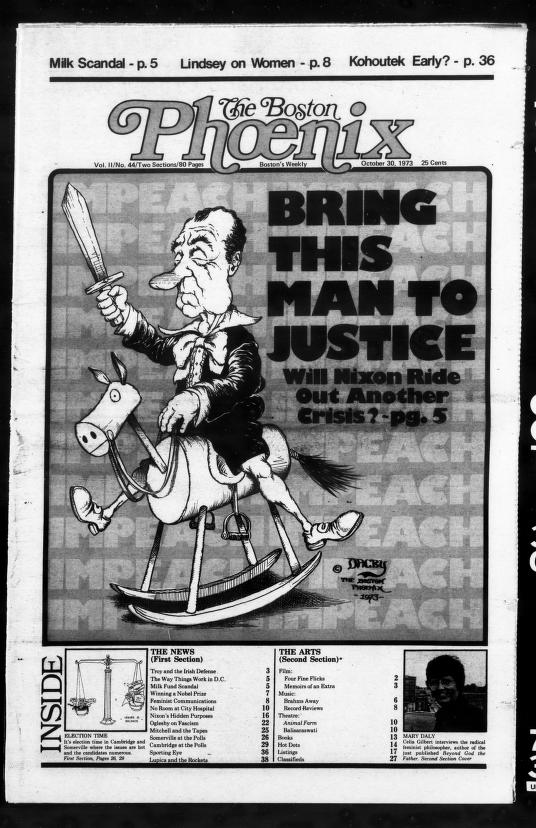For more than 40 years, The Boston Phoenix was the city’s largest alternative weekly in covering local politics, arts, and culture.

“It was really a pretty legendary paper. The style of the writing and the quality of writers were nationally known,” said Carly Carioli, who started at the newspaper as an intern in 1993 and became its last editor-in-chief.
With the advent of online advertising, it struggled like many independent newspapers to compete. In 2013, the Phoenix folded.
After the publication shut down, owner Stephen Mindich wanted the public to be able to access back issues of the Phoenix. The complete run of the newspaper from 1973 to 2013 was donated to Northeastern University’s special collections. The family signed copyright over the university.
Librarians led a crowdsourcing project to create a digital index of all the articles and authors, which was helpful for historians and others in their research, said Giordana Mecagni, head of special collections and university archivist. Northeastern had inquired about digitizing the collection, but it was cost prohibitive.
As it turns out, the Internet Archive owned the master microfilm for the Phoenix and it put the full collection online in a separate collection: The Boston Phoenix 1973-2013. Initially, the back issues were only available for one patron to check out at a time through Controlled Digital Lending. Once Northeastern learned about the digitized collection, it extended rights to the Archive to allow the Phoenix to be downloaded without controls.
Read The Boston Phoenix at the Internet Archive
“All of a sudden it was free to the public. It was wonderful,” Mecagni said. “We get tons and tons of research requests for various aspects of the Phoenix, so having it available online for free for people to download is a huge help for us.”
Inquiries range from someone trying to track down a classified ad through which they met their spouse, or an individual looking up an article about a band. The paper was a leader in writing groundbreaking stories about the LGBTQ community, the AIDS crisis, race and the Vietnam War—often issues not covered in the mainstream press. “Making that coverage public is adding an immense amount to the historical record that would not be there otherwise,” said Carioli. He said he appreciates the preservation and easy access to back issues, as do other journalists, researchers and academics.
“It’s a dream come true,” said Carioli of the Internet Archive’s digitization of the newspaper. “The Phoenix was invaluable in its own time, and I think it will be invaluable for a new generation who are just discovering it now. It was a labor of love then and the fact that it’s online now is huge for Boston, but also for anyone who’s interested in independent media and culture.”
I wrote some pieces for the Boston After Dark in the early 70s. How do I find these features. I no longer remember the dates they appeared.
Will the Providence Phoenix also be available?
Depending on the quality of the OCR, you may be able find them using full text search, e.g. https://archive.org/details/pub_boston-phoenix?query=pozniak&sin=TXT